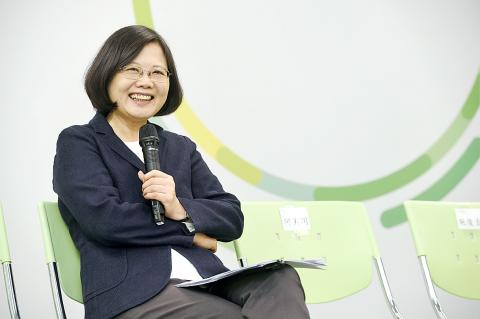Democratic Progressive Party (DPP) presidential candidate Tsai Ing-wen (蔡英文) yesterday announced her “Asian Silicon Valley” initiative, saying that the plan is to create the basis for business development for the next two decades and would welcome talent from all over the world, including China.
In a news conference at DPP headquarters in Taipei, Tsai said that if elected, she would seek to create an integral zone for innovative high-tech industries near Taiwan Taoyuan International Airport to attract talent from within Taiwan and abroad, and push for closer cooperation between businesses in Taiwan and in Silicon Valley in the US, while creating more opportunities for young people.
“I know many Taiwanese who live in Silicon Valley,” Tsai said. “A lot of them have been there for decades. They have rich experience and have accumulated assets. Many of them are investing in start-ups.”

Photo: George Tsorng, Taipei Times
“If we could make connections to this senior talent in Silicon Valley to give Taiwanese entrepreneurs more opportunities, to have more exchanges with angel investors on the US’ west coast, to connect Taiwan’s innovative businesses and capital market with the world, we could find a starting point to move forward,” she said.
Tsai said she does not plan to attract foreign direct investment in the traditional sense, but rather seek to better connect research and development in Taiwan and the Silicon Valley, as well as enhancing exchanges of talent between the two sides.
Taoyuan was chosen for the initiative because of its central location. It is within a three-hour flight of Hong Kong, Shanghai, Seoul, Tokyo or Singapore, as well as being midway between company headquarters in Taipei and research and manufacturing sites in the Hsinchu Science Park.
“The initiative sets the basis for development of Taiwanese businesses over the next two decades and is to overturn the outflow of Taiwanese talent and capital,” Tsai said. “The world is waiting on Taiwan and the DPP will move forward with all of you.”

‘DENIAL DEFENSE’: The US would increase its military presence with uncrewed ships, and submarines, while boosting defense in the Indo-Pacific, a Pete Hegseth memo said The US is reorienting its military strategy to focus primarily on deterring a potential Chinese invasion of Taiwan, a memo signed by US Secretary of Defense Pete Hegseth showed. The memo also called on Taiwan to increase its defense spending. The document, known as the “Interim National Defense Strategic Guidance,” was distributed this month and detailed the national defense plans of US President Donald Trump’s administration, an article in the Washington Post said on Saturday. It outlines how the US can prepare for a potential war with China and defend itself from threats in the “near abroad,” including Greenland and the Panama

A wild live dugong was found in Taiwan for the first time in 88 years, after it was accidentally caught by a fisher’s net on Tuesday in Yilan County’s Fenniaolin (粉鳥林). This is the first sighting of the species in Taiwan since 1937, having already been considered “extinct” in the country and considered as “vulnerable” by the International Union for Conservation of Nature. A fisher surnamed Chen (陳) went to Fenniaolin to collect the fish in his netting, but instead caught a 3m long, 500kg dugong. The fisher released the animal back into the wild, not realizing it was an endangered species at

The High Prosecutors’ Office yesterday withdrew an appeal against the acquittal of a former bank manager 22 years after his death, marking Taiwan’s first instance of prosecutors rendering posthumous justice to a wrongfully convicted defendant. Chu Ching-en (諸慶恩) — formerly a manager at the Taipei branch of BNP Paribas — was in 1999 accused by Weng Mao-chung (翁茂鍾), then-president of Chia Her Industrial Co, of forging a request for a fixed deposit of US$10 million by I-Hwa Industrial Co, a subsidiary of Chia Her, which was used as collateral. Chu was ruled not guilty in the first trial, but was found guilty

DEADLOCK: As the commission is unable to forum a quorum to review license renewal applications, the channel operators are not at fault and can air past their license date The National Communications Commission (NCC) yesterday said that the Public Television Service (PTS) and 36 other television and radio broadcasters could continue airing, despite the commission’s inability to meet a quorum to review their license renewal applications. The licenses of PTS and the other channels are set to expire between this month and June. The National Communications Commission Organization Act (國家通訊傳播委員會組織法) stipulates that the commission must meet the mandated quorum of four to hold a valid meeting. The seven-member commission currently has only three commissioners. “We have informed the channel operators of the progress we have made in reviewing their license renewal applications, and